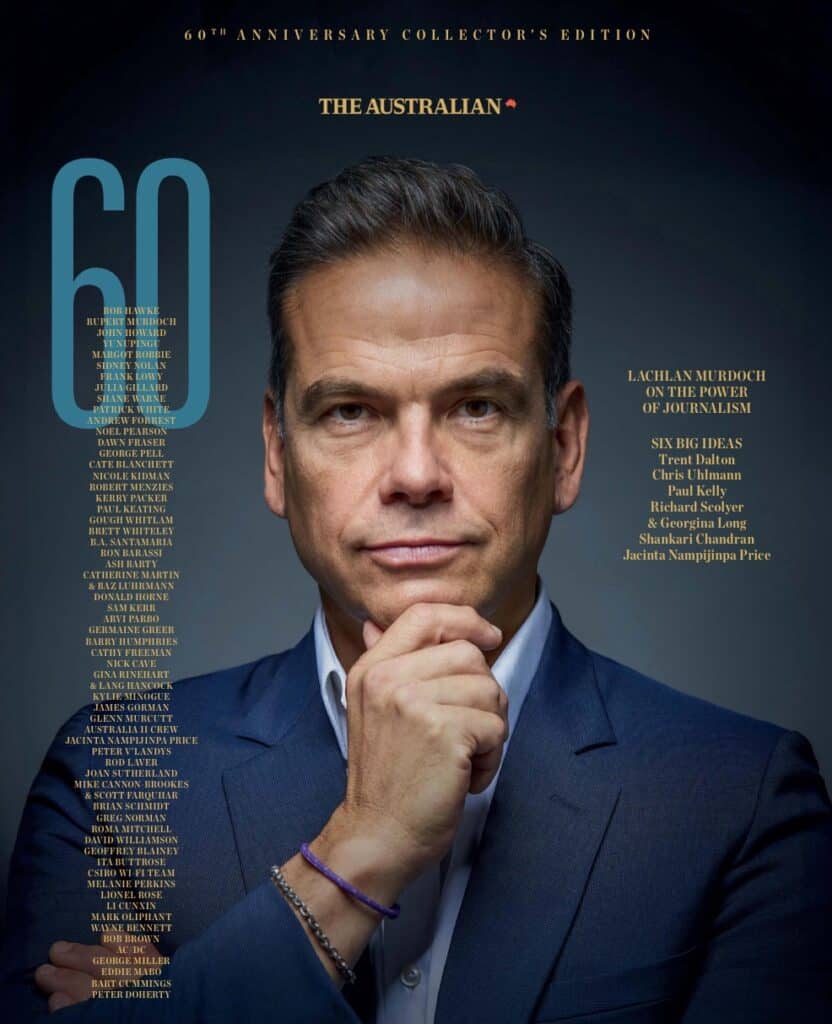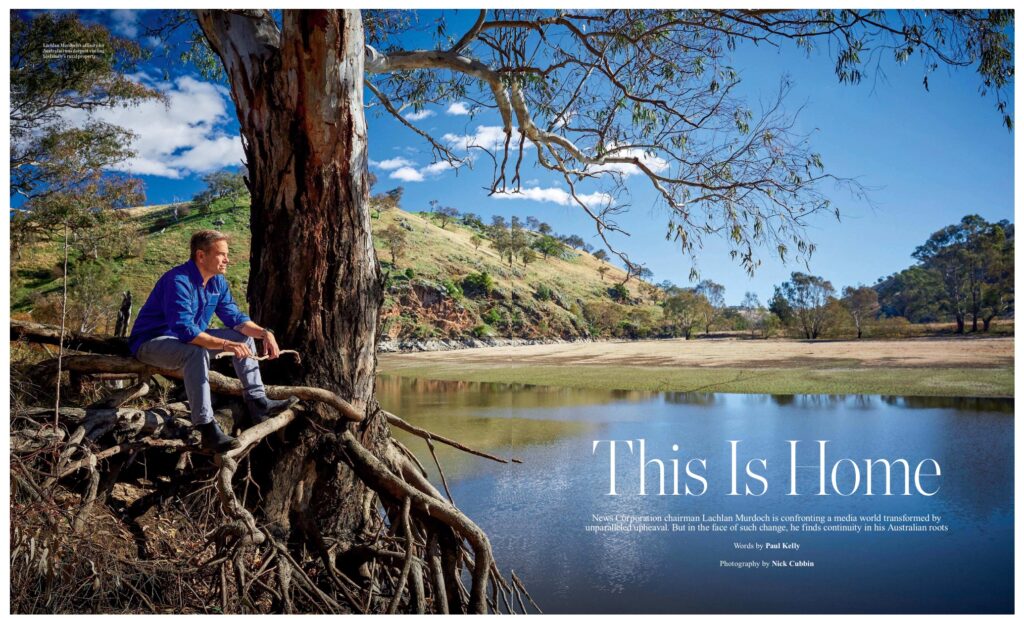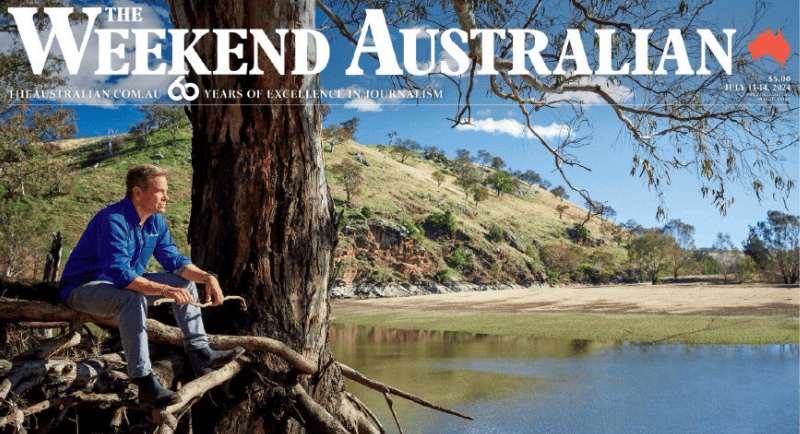Lachlan Murdoch doesn’t do a lot of interviews. These days the Fox Corporation CEO and News Corporation chairman is most likely to be heard speaking publicly on the quarterly Fox Corporation results call. Or maybe being interviewed at an investment conference.
He recently sat down for a long interview with The Australian’s editor-at-large Paul Kelly. The national daily has published the interview this weekend as part of its 60th anniversary celebrations.
See also: The Australian’s 60 year collector’s edition out this weekend
Murdoch also spent time with Sydney photographer Nick Cubbin who shot the cover portrait for the special collector’s edition of The Weekend Australian Magazine. Cubbin also provided photographs of Murdoch at the family property Cavan, south of Sydney.
Below we publish some of the highlights of the interview.
Celebrating 60 years of The Australian
“Everything comes down to the journalism, to the quality of reporting, the opinion, the analysis, breaking news and understanding our audiences.
“[The Australian] reflects a sense of optimism for this country and for the debate in this country, the direction we aspire for the country. The paper is concerned about how Australia can fulfil its full potential as a nation.
“My focus is the future of the paper, the importance of the paper, and our role in democracy.”

Lachlan Murdoch photographed by Nick Cubbin for the cover of The Australian’s 60th anniversary magazine. The special edition was edited by Petra Rees. Cubbin also took portraits of many of the other 60 people featured in the magazine.
News Corporation
“Our company has a unique voice that no one else has. There are a number of people that say The Wall Street Journal and The Australian are providing this voice and that, if it wasn’t for us, that voice would not be available and would not exist in the political and cultural debates that are of critical importance to our communities and societies.
“I believe that if it wasn’t for The Australian today, if the policy debate in Australia today was being driven by the ABC, then we would be a totally different country.
“I think our role is essential both here in Australia but also in Britain and the United States. This is absolutely how I see my leadership mission. It’s also our responsibility as a company and I feel that very strongly.”
How often does Lachlan talk to his father?
“It’s most days. Sometimes only for a minute or two to check in. When we’re in the same city, we spend more time together.”
[What has he learnt most from his father?] “The value of curiosity. He is always questioning, always thinking, always learning.”
See also: The Australian at 60 – Sky News Aust boss Paul Whittaker interviews Rupert Murdoch
He still calls Australia home
“I’m Australian. That’s how I see myself. My family’s Australian. Obviously Sarah, my wife, is Australian. My kids are all Australian. Sydney is home to us.
“I spend as much time working overseas as I do here, but Australia is certainly home.”
Lachlan Murdoch has had a long involvement with The Australian
“I must have been in my mid-teens, 14 or 15 years old. I had a summer job because in America you have these long summer holidays and on one of them I was sent to Sydney. I had a job cleaning the presses. I was learning the trade, here in Holt Street, when we still had the presses down in the basement.
“That was a great romantic time in newspapers. You’d know whether editorial had gotten off the stone on time, then the presses would rumble into action. You could feel it through the whole building, you’d check your watch, are we on time or not? Working on those presses was a great experience for me. I learnt a lot about the fundamentals of the business and knew the people who got the paper out every night.”
[Murdoch would later work in Sydney as publisher of The Australian.]
“When I do the math, I was involved around ’94 and ’95, so I’ve probably been involved for half the history of the paper.”

Lachlan Murdoch on the family property Cavan. Photographed by Nick Cubbin and the opening spread of the Paul Kelly interview. The image was also used on the front cover of the newspaper this weekend (top image)
Politics in Australia
“We are politically more centrist, less driven by extremes on the right or left. That’s a real benefit. It’s an Australian advantage but an advantage we have to protect, not something we can take for granted.
“I think successive governments, whether Labor or Liberal, have underperformed on their promise. We have avoided taking some of the hard decisions we need as a country and that’s under both sides of politics.”
The challenges posed by big tech
“Social media platforms don’t value journalism.
“They can sell it. They can monetise it. But they don’t put anything back into journalism. This is a very dangerous situation for democracies. If you take away the ability to invest in journalism because social media companies don’t value it, that affects our whole society and potentially in a very dangerous way. Those companies don’t value it unless they’re forced to and that’s something their customers, their users, and the regulators have to look at, because it’s fundamental to how our democratic system works.
“When people say that they get their news from X/ Twitter or through TikTok or through Facebook, a lot of times it’s our journalism and our stories that they’re reading, linked to those social media sites. But, if we continue to get the journalism right, and we continue to get the investment and put our content in front of as wide an audience as possible, then we’ll continue to evolve and succeed.”
Monday in Mediaweek: Editor-in-chief Michelle Gunn on The Australian at 60 – Past, present and the future
See also: The Australian unveils new leadership team led by Nicholas Gray and Michelle Gunn
